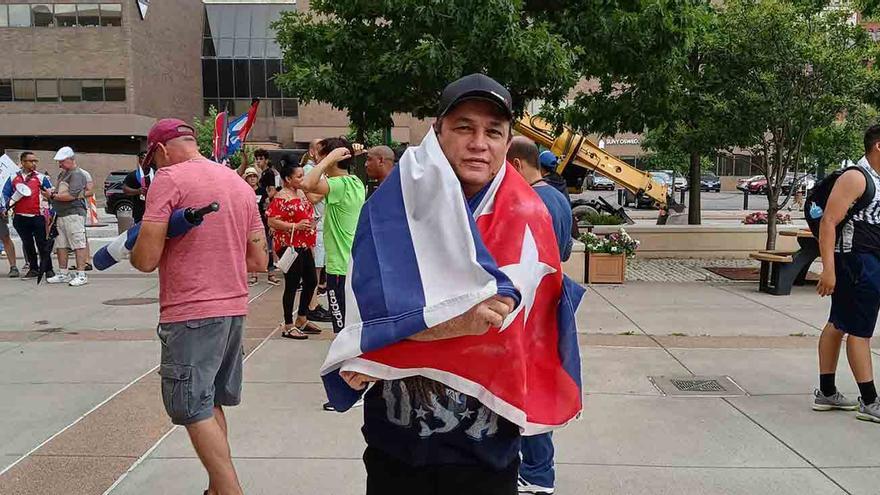
![]() 14ymedio, Havana, 18 February 2024 — The former prisoner of the Black Spring and Cuban activist, Juan Carlos Herrera Acosta, died this Saturday of a massive heart attack at the age of 57, in the city of Syracuse, in the state of New York, United States. During his exile, the independent journalist maintained an intense activism against the Island’s regime.
14ymedio, Havana, 18 February 2024 — The former prisoner of the Black Spring and Cuban activist, Juan Carlos Herrera Acosta, died this Saturday of a massive heart attack at the age of 57, in the city of Syracuse, in the state of New York, United States. During his exile, the independent journalist maintained an intense activism against the Island’s regime.
Herrera Acosta, who in April 2003 was sentenced to 20 years in prison for his opposition to the Cuban regime, spent seven years and seven months in prison. During his stay in the Cubasí prison in Holguín and in the Combinado of Guantánamo, the dissident, who was also a reporter for the Eastern Free Press Agency, was subjected to severe punishment.
In August 2008, Herrera Acosta sewed his mouth shut in the Cubasí penitentiary center and remained in that condition for 12 days in protest against the violations of his human rights. Twenty opponents protested in Holguín in support of the prisoner; among them was Orlando Zapata Tamayo, who would die two years later after a long hunger strike.
In August 2008, Herrera Acosta sewed his mouth shut his mouth in the Cubasí penitentiary center and remained in that condition for 12 days in protest of the violations of his human rights
That same year, Herrera Acosta was transferred from the Cubasí prison to the Combinado of Guantánamo. “They brought me closer to my province, but they took me away from my family. What I have suffered is not enough for them,” he said when he learned of his imminent imprisonment in the prison known as “a den of terror.”
While in prison, the independent journalist suffered a family tragedy. On March 12, 2008, a bus traveling from Havana to Guantánamo was in an accident, and his only daughter, Lianet Herrera Disco, 14, lost her life, along with her mother, Elizabeth Disco Tito, 31, and her sister Elianet González Disco, 2 years old.
It would not be until August 19, 2010 that Herrara Acosta was able to leave prison and go into exile in Madrid after a negotiation among the Cuban regime, the Catholic Church and the Spanish Government. On that occasion, dozens of Black Spring prisoners and their families left the Island, in the middle of an operation that some classified as a “forced banishment.”
“I consider myself still a prisoner, because there are still many of my friends in Cuban prisons,” Herrera Acosta told the Committee for the Protection of Journalists on that occasion.
A year after his exile he settled in the United States and continued his activism for the freedom of Cuba. In May 2022, Herrera Acosta confronted Dangel, a defender of the Cuban regime who called himself “100% Fidel” on social networks and also lived in Syracuse. Acosta told Cubanet that the sympathizer of the Cuban regime had “denounced the political prisoners and the Ladies in White*.”
This Saturday, after the activist’s death was known, several former prisoners of the Black Spring expressed their sorrow on social media and sent their condolences to the family. Among them was the Cuban dissident Pablo Pacheco Ávila, who defined him as a brother of the 75 opponents who were convicted in 2003.
This Saturday, after the death of the activist was known, several former prisoners of the Black Spring expressed their sorrow on social media and sent their condolences to the family
“It is with deep sorrow that I learned about the death of my friend and brother Juan Carlos Herrera Acosta, a brave man who dedicated his life to the struggle for freedom and human rights in Cuba,” the former political prisoner, Normando Hernández, told Martí Noticias.
“His departure leaves an indelible void in our hearts,” he added. Hernández is the director of the Cuban Institute for Freedom of Expression and Press. Several colleagues recalled that Herrera Acosta maintained his denunciations of the Cuban dictatorship and the allied authoritarian regimes of Havana until the end of his days.
Just this Friday, a few hours before he passed away, he had accused Russian President Vladimir Putin of the death in prison of the opponent Alexei Navalny. “The world is witnessing the emergence of a new Stalin and a new Hitler,” Herrera Acosta warned in a video published on YouTube.
*Translator’s note: The Ladies in White — which demonstrates regularly for human rights — was started by the wives of the Black Spring prisoners, and continues its activities to this day.
Translated by Regina Anavy
____________
COLLABORATE WITH OUR WORK: The 14ymedio team is committed to practicing serious journalism that reflects Cuba’s reality in all its depth. Thank you for joining us on this long journey. We invite you to continue supporting us by becoming a member of 14ymedio now. Together we can continue transforming journalism in Cuba.
